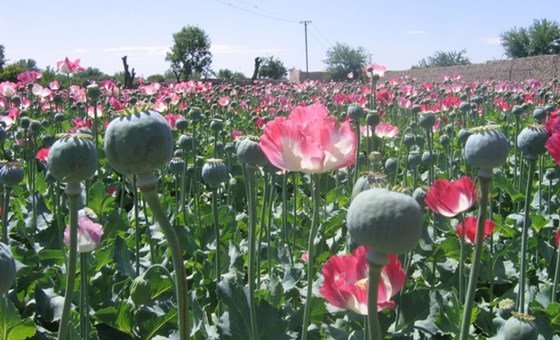
The rebound follows a massive 95 per cent decrease in 2023, when the ban nearly eliminated poppy production nationwide, leading to a severe decline in Afghanistan’s opium output.
However, while cultivation has increased, the current levels remain substantially lower than in 2022, which saw 232,000 hectares under poppy cultivation.
UNODC Executive Director Ghada Waly emphasized the urgency of sustainable alternatives for Afghan farmers, given their pressing challenges.
“With opium cultivation remaining at a low level in Afghanistan, we have the opportunity and responsibility to support Afghan farmers to develop sustainable sources of income free from illicit markets,” she said.
“The women and men of Afghanistan continue to face dire financial and humanitarian challenges, and alternative livelihoods are urgently needed.”
Shift in cultivation patterns
The UNODC report pointed to a notable geographic shift in cultivation patterns. While southwest Afghanistan has traditionally been the country’s opium hub, 59 per cent of opium cultivation this year has taken place in provinces in the northeast.
This represents a nearly four-fold increase in the region compared to last year, suggesting the potential for both adaptive planting practices and the influence of market pressures, as rural communities seek alternatives amidst strict enforcement of the opium ban.
A factor behind the resurgence in opium cultivation could be market dynamics combined with hardships farmers face, according to UNODC. Dry opium prices stand at approximately $730 per kilogramme in the first half of 2024, a steep increase from pre-ban levels, which averaged around $100 per kilo.
“The high prices and dwindling opium stocks may encourage farmers to flout the ban, particularly in areas outside of traditional cultivation centres, including neighbouring countries,” UNODC said.
Farmers left without sustainable alternatives faced a more precarious financial situation, underscoring the need for other income streams so they can become resilient against returning to poppy cultivation in the future, it added.
Need for support
Roza Otunbayeva, Special Representative of the Secretary-General for Afghanistan and head of the UN Assistance Mission in the country (UNAMA), acknowledged both the success in reducing opium output and the ongoing hardship faced by Afghan farmers.
“This is important further evidence that opium cultivation has indeed been reduced, and this will be welcomed by Afghanistan’s neighbours, the region and the world,” she said.
She also cautioned however that rural Afghan communities have lost a vital income source and urgently require international assistance to ensure a sustainable shift away from opium production.
“If we want this transition to be sustainable…they desperately need international support.”
